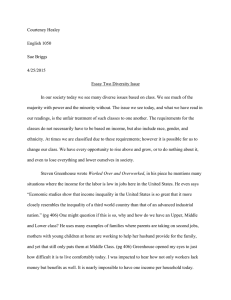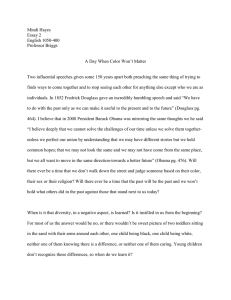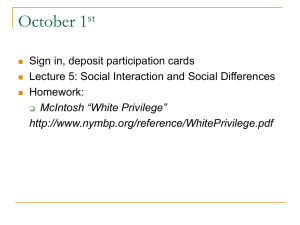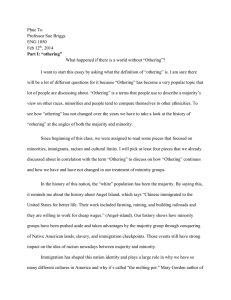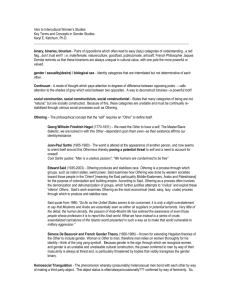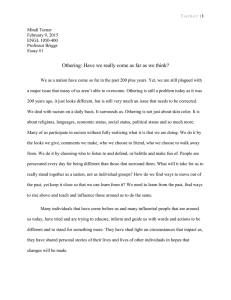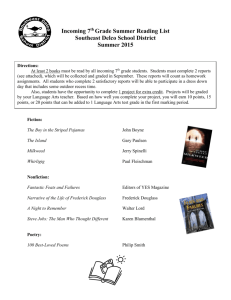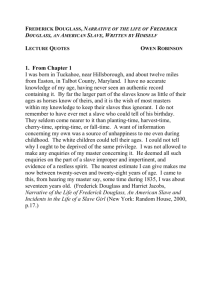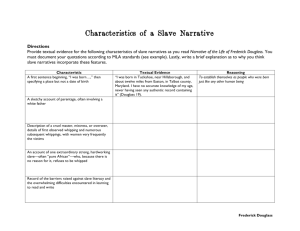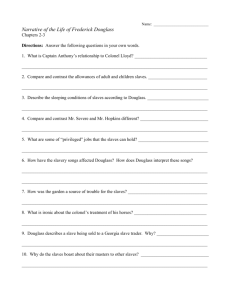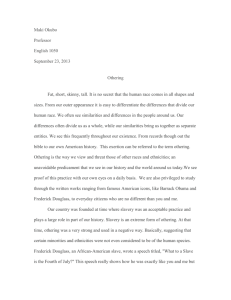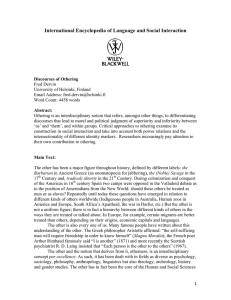Essay 1 - WordPress.com
advertisement
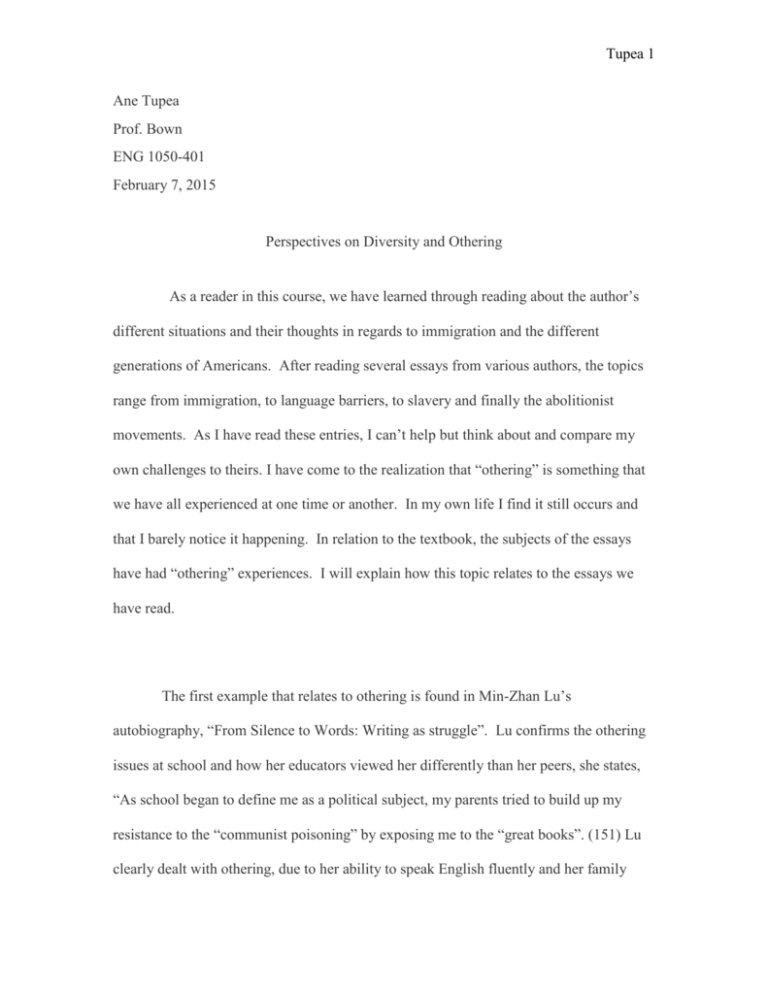
Tupea 1 Ane Tupea Prof. Bown ENG 1050-401 February 7, 2015 Perspectives on Diversity and Othering As a reader in this course, we have learned through reading about the author’s different situations and their thoughts in regards to immigration and the different generations of Americans. After reading several essays from various authors, the topics range from immigration, to language barriers, to slavery and finally the abolitionist movements. As I have read these entries, I can’t help but think about and compare my own challenges to theirs. I have come to the realization that “othering” is something that we have all experienced at one time or another. In my own life I find it still occurs and that I barely notice it happening. In relation to the textbook, the subjects of the essays have had “othering” experiences. I will explain how this topic relates to the essays we have read. The first example that relates to othering is found in Min-Zhan Lu’s autobiography, “From Silence to Words: Writing as struggle”. Lu confirms the othering issues at school and how her educators viewed her differently than her peers, she states, “As school began to define me as a political subject, my parents tried to build up my resistance to the “communist poisoning” by exposing me to the “great books”. (151) Lu clearly dealt with othering, due to her ability to speak English fluently and her family Tupea 2 being a higher class than most of her peers. As we read along she continues to share her struggles with her home language and her school language, it seems the othering struggles seemed to interfere with her own thoughts. (154) Additionally, we read an article written by Gloria Anzalua, a Latina American shared her experiences in our textbook. Anzalua compiled an article entitled, “How to Tame a Wild Tongue”. Throughout reading this section, I couldn’t help but try to compare my life experiences with speaking my own native tongue growing up and how sometimes I would receive critiques of my accent when speaking, I always seemed to comments that referred to the way I spoke that I sounded too American. Similarly, Anzalua explains how she felt she was robbed of her language throughout her life. I too feel that I could never completely establish my own language identity so I stuck with what felt comfortable. According to Anzalua, she feels a connection to other Latinos that are second generation Americans, one harsh recollection she had of her teacher speaking to her was when her teacher stated, “If you want to be an American, speak American. If you don’t like it, go back to Mexico where you belong”. (521) Furthermore, Anzalua continues to share the expectations that she dealt with from being raised in America and speaking two languages. She seemed to have a somewhat disconnected association with both cultures. And as most people who are from immigrant families can vouch for this, the difficulty of balancing out the two identities and cultural ties can be challenging. Tupea 3 Another example of “othering”, which was the most interesting to me was written by abolitionist and former slave, Frederick Douglass entitled, “What to the Slave is the Fourth of July” in this great speech Douglass, begins by noting the celebration of the Fourth of July to the average American (Caucasian). He simply states that his life as a freed slave remains the same. Although Americans celebrated their freedom on July fourth, he didn’t feel that there was much to celebrate. Douglass’ main objective was to broaden the perspective of the audience. Douglass’ wanted to communicate to his audience, the fact that not all who reside in America are free to enjoy their lives, as other Americans were able to. Douglas stated, “What have I of those I represent to do with your national independence?” (465). This was quite thought provoking for his audience, in fact, his speech was quite lengthy, but he captivated his audience and helped them to see his perspective and other African American’s perspectives too. In summary, the point Douglass was trying to make in his speech was that it’s quite ironic that on that day of his speech, those who were present at this event were gathered to celebrate freedom of our great nation, not all Americans had equal privileges/freedom to partake in such a blessed event. This specific section truly had me pondering and made me feel such a solemn respect for those who have paved the way for equality. My final thought is that although we currently all have equal rights as a nation today, some of us who are in younger generations aren’t always aware of how thankful we should be for those who have sacrificed so much for us to have the opportunity to Tupea 4 experience the freedoms that we all enjoy in our daily lives. Sometimes we dwell too much on materialistic things to actually take the time to reflect upon our rights, freedom. The last author that I’ll share about is Margret Mead she wrote an article titled, “We Are All Third Generation,” in this article she discusses that educators seem to overly state that as a nation we have a tendency to be a proud people and we tend to be over protective of our children’s progress. (97). Mead continues to share that our society as Americans seems to live in unrealistic lifestyle our morals have changed over time and this is something I agree with. Diversity is a good thing to embrace, loss of morals and a sense of brotherhood is not a good thing. As I conclude this essay, I will share my rhetorical analysis about one of our assigned reading topics. This analysis will cover the article written by Mary Gordon, which is called, “More Than Just a Shrine”. Gordon composes a reflective article about her connection with Ellis Island. She discusses in detail her visit to the immigration center on Ellis Island and describes her feelings connected to the landmark. Her connection to her ancestors and her own personal relationship to them helps to establish credibility. The information she shares about her immigrant grandparents’ experiences initially upon entering America. She shares the difficulties that many immigrants faced in migrating to the United States of America. (433) Tupea 5 Throughout the experiences which we read that Gordon was able to absorb as much of the experiences of her ancestors, from hearing about the family’s history, specifically about their journey to America. Such great difficulties they faced as they struggled through making America their new home. Gordon’s family history unquestionably made such a profound impact on her life that she felt inspired to share their story with her audience. She establishes the emotional appeal for her audience and shares facts that help to ensure her credibility and provide more informative details for her audience. In our recent class discussions, a classmate of mine named Lisa Johnson mentioned some remarks that help to further indicate Gordon’s experiences in regard to her ancestor’s immigration. I am referring to her comments in week two of our discussion board. Lisa stated something that goes along with my own thoughts, in response to Mary Gordon’s article, “I could almost feel her disappointment. It was as if she was trying to convey that she felt the discrimination so personally that I had to remind myself that she was referring to her family and she was not actually there.” Often times I find an article online through different media sources that celebrate individuals who, despite difficult circumstances, were able to overcome adverse situations. Whether we are related by blood to those who have faced these various challenges in diversity, it is important to realize that their stories are our stories. After all, we are citizens of this united country. It is important to always remember those who have Tupea 6 helped create a stronger America so that when we are faced with uncertain events, we are able to stand tall and persevere to the best of our ability. Tupea 7 Works Cited Lu, Min-Zhan. “From Silence to Words: Writing as Struggle.” George, Diana, and John Trimbur.Reading Culture. White Plains, NY: Longman, 2011. 151, 1George, Diana, and John Trimbur. Douglass, Frederick. "What to the Slave is the Fourth of July." George, Diana and John Trimbur. Reading Culture. Eighth Edition. 460-475.Culture. White Plains, NY: Longman, 2011. 151-54. Print.54. Print. Gloria Anzaldua “How to tame a wild tongue” George, Diana and John Trimbur. Reading Culture 8th Edition. Boston: Pearson, 2012. 521-527 Mead, Margaret. "We Are All Third Generation." George, Diana and John Trimbur. Reading Culture. Eighth Edition. 94-101. Gordon, Mary. "More than Just a Shrine: Paying Homage to the Ghosts of Ellis Island." George, Diana and John Trimbur. 2012. 430-435.
